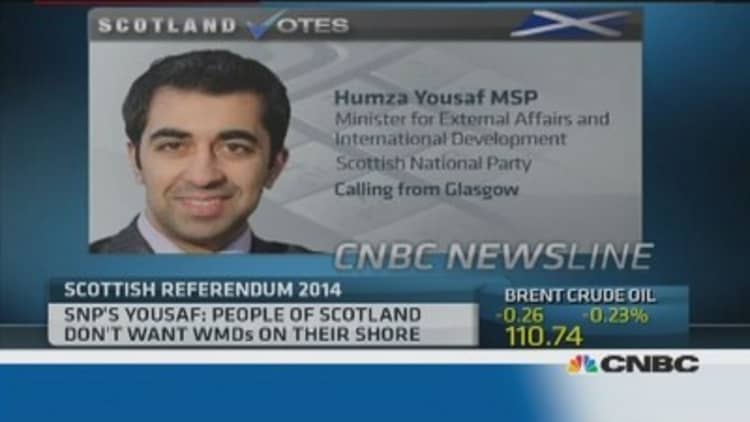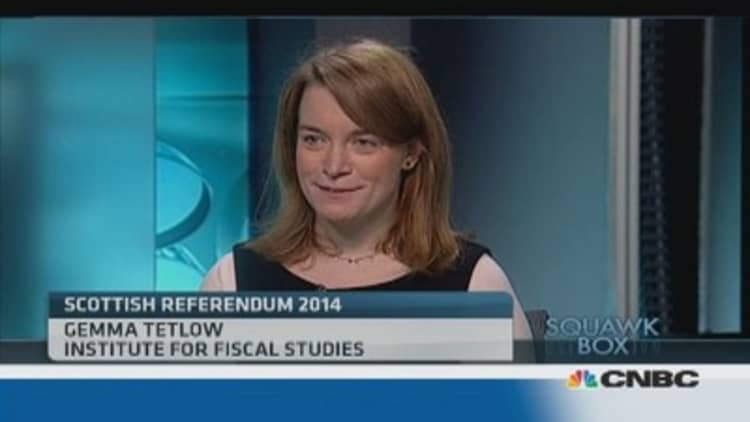Scotland's campaign to break ties with the rest of the U.K. will kick off in earnest this week with the launch of the pro-independence campaign – but the economic implications of going it alone are still being fiercely debated.
In September 2014, Scots voters will be asked in a referendum whether Scotland should be an independent country. If it's a Yes, then Scotland will break ties with the rest of the United Kingdom and formulate its own economic, political and defense policies.
With less than 10 months to go before next September 18 vote, it looks as though undecided voters will hold sway. At the moment, 47 percent of voters in Scotland would vote against independence, while 38 percent are in favour – but 15 percent are still undecided, according to a poll for the Sunday Times. Scotland has had some powers of self-government since the devolution of some of the centralized powers to the Scottish parliament in 1999.
There are concerns that Scotland's economy would struggle without support from the rest of the U.K. South of the border, the U.K. Treasury has argued that Scottish independence would damage the country's economy, claiming its people will face tax rises of £1,000 per head. Since the credit crisis, its two biggest banks, Royal Bank of Scotland and HBOS (now part of Lloyds), have been supported by the U.K. taxpayer in different ways.

(Read more: Would independent Scotland have banking crisis?)
Resentment over austerity measures and policies imposed by the London-based government have helped the independence campaign. As the Scots are fond of pointing out, there are more pandas in Scotland than members of parliament from the ruling Conservative party - yet that same party has the most sway in economic decisions which affect the country.
"This is a serious democratic deficit," Humza Yousaf, the Scottish Minister for external affairs and international development and a leading member of the pro-independence campaign, told CNBC.
The Scottish National Party, which has spearheaded the independence campaign, launched a white paper laying out its plans for independence on Tuesday.
"This (report) is adding a vision that is optimistic, hopeful and aspirational, compared to the negativity of those who are against independence," Yousaf said. He argued that Scotland would have been able to bail out RBS itself.
"Having fiscal levers is incredibly important to creating a more prosperous, wealthy and fairer society."
The report argued that Scotland should stay part of the European Union but keep the U.K. pound as its currency. The SNP is also keen to lower corporation tax – a method which has helped attract investment to neighboring Ireland.
(Read more: Should Scotland drop sterling for euro?)

However, there are concerns that an independent Scotland would struggle economically. The devolved Scottish government already spends more per head on education and healthcare compared to the rest of the U.K., according to the Institute for Fiscal Studies , and would need to raise taxes to address falling oil and gas revenues soon after independence.
There are also risks that if Scotland becomes independent, its bond yields would be higher than the U.K. as a whole – between 72-165 basis points according to the IFS – which would mean that its debt repayments were higher.
North Sea oil, the source of much of Scotland's revenue, is a finite resource, and the oil price may be on its way down again if Iranian oil comes back to the market.
An independent Scotland would have to tighten its belt further, as oil and gas revenues dry up, according to Gemma Tetlow, IFS program director.
"In the longer term, you need to find some way of changing your tax and benefit system to reflect that you will no longer have that source of revenue," she told CNBC.
The SNP is also arguing that an independent Scotland should be able to reduce spending by halting the funding of weapons of mass destruction.
"When we are facing some of the worst austerity measures, how can you justify spending billions on nuclear weapons that nobody is ever going to use?" Yousaf asked.
- By Catherine Boyle, CNBC. Twitter: @cboylecnbc


